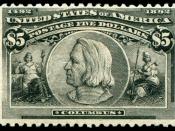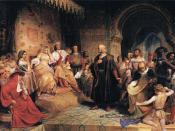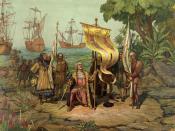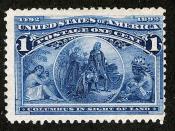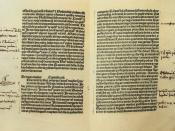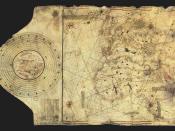When we think of the European age of exploration, we remember names like Christopher Columbus and Marco Polo. They were some of the first people to set out and explore the world. They took all risks in the face of danger, and a lot of times when the odds were all set against them. We can recall everything we have learned about the beginning of the Americas and for sure, Christopher Columbus?s name will continue to occur time after time. There were many motives that led up to his explorations, as well as his failures that came with them, but nothing would compare to his accomplishments and the knowledge he gained and spread throughout the world.
Christopher Columbus was hungry for the exploration of the world even at a rather young age. After reading a book by Marco Polo that discussed the ideas of gems and spices, his hunger went into a rage, as well as the peoples around him.
As our book tells us, the fighting men and nobles had saw everything from the finest silk, to the wall hangings fit only for castles. These stories simply ?whetted the appetite of Columbus?s generation and lifted its eyes to far horizons? (Nash 1).
Most people used traders to get the items they wanted. However, prices were very high and the money was going one way, while the goods went another way. The Christian Europeans trade route to the east was crushed after Constantinople was taken over by the Turkish. People were worried how they would be able to regain access to the Orient. They desperately depended on this Orient. Columbus first motive to travel the sea had appeared to him (Nash 2).
The Renaissance also played as a motive in preparing Columbus for exploration, as well as his society. Not so happy with the current society, scholars, mostly Jewish and Arab, exploited the wonderfulness of these civilizations. Wanting fortune and fame, as well as wanting to better human life and keep it close to god, Columbus was ready to set out for the new lands (Nash 2).
An earthly paradise was strongly believed in by Columbus and his society. This brought the motive of Myth into light. Life was wonderful in this paradise of course. Precious jewels and gold was to be found there. Along with everlasting joy, and a sin free life, who could resist something so tempting? This seemed so true because no one had been far out into the unexplored, so it made sense that paradise was waiting out there (Nash 5).
Columbus?s ambition, restlessness, and urge to fulfill a mission for Christianity, proved the seas were just the place for him to go (Nash 2). One of Columbus?s first missions he set out for was Portugal. A battle had broken out on the way there and left Columbus injured and to lie upon a beach shore of Portugal. This, according to Nash, was the best place for Columbus to pursue a life as an explorer.
After recovering for 6 months, his health was in good shape and Columbus set out for Iceland. He learned Spanish and Latin later on and married into a wealth family from Portugal. Now living on Port Santo, Columbus explored the hump of West Africa, which added skillfulness to his sea captain ways (Nash 4).
While Columbus achieved many goods in trade through his explorations and more knowledge of seas, his biggest accomplishments and first failures were about to come; his voyage for Asia. After receiving the okay from the Monarchs, Columbus was ready with his crew, and so were there 3 ships; Nina, Pinta, and Santa Maria.
Finally Columbus and his men did find sight of one of the Lesser Antilles, his crew and him came ashore (Nash 10). However, this island to Columbus was a failure. It had no treasures that the orient was said to have. Still some explored Cuba, and there was the same disappointment. All they found were poor natives and a dangerous jungle (Nash 11).
More failure was on its way for Columbus and his crew. On Christmas day the Santa Maria had to be abandoned because it had run into some reef and was unassailable. Leaving men behind to search for gold, he made his way home with the crew, the Pinta, and the Nina (Nash 11).
Again Columbus gathered men and ships to sail the mainland of Asia and Japan. This expedition was a total failure. He found little gold, poor subjects, and to make matters worse, the men he had left behind on the previous island, were nonexistent (Nash 13). Most likely these men had been killed or taken off into the jungle. Having to then deal with the war brought on with the Indians, the missionary was a total loss in itself (Nash 14).
Columbus tried to be a colonial governor on the land he had found, but this failed as well. Leaving all hope in the Queen Isabella, who was so faithful in him, was all lost when he learned of her death and funds from the court were stopped (Nash 14).
Eventually having his health decline and giving up his expeditions, Columbus accomplished a lot. He discovered some of the most important land, and despite his failures and set backs that came with it all, he achieved quite a bit. Having treasure in mind, instead of extending civilization, may have set him back, but Christopher Columbus extended the gateway for further discoveries of the Americas.
